Is TikTok safe? Risks you should be aware of
TikTok is one of the world’s most popular social media apps, with more than a billion monthly active users. But national security concerns have called the app’s future in the U.S. into question. Learn how safe TikTok is and how Norton 360 Deluxe, with its built-in VPN and scam-detection technology, can help you secure your online activity.

Editors’ note: With the Supreme Court’s January 2025 decision to uphold the U.S. law that forces the sale of TikTok to a non-Chinese owner or bans it, followed by President Trump’s executive order to delay enforcement of the ban, the app’s future in the U.S. remains uncertain.
With many U.S.-based TikTok users wondering if they can continue using the app — and even flocking to other apps, including RedNote, another Chinese-owned social media platform — questions of privacy, access, and national security have been thrust to the forefront of the broader conversation around social media. Now, it’s more important than ever to understand the potential risks of TikTok, as well as the different types of scams you might find on the platform.
What is TikTok?
TikTok is a short video hosting and social media platform developed by the Beijing-based media company ByteDance. Despite its popularity, TikTok has been at the center of a few controversies over the years, with parents, businesses, and lawmakers expressing concerns about the app’s security, trustworthiness, and potential ties to the Chinese government.
Data collection, harmful content, and national security are some of the app's most contentious areas. So, is TikTok safe to use? And are some age groups more vulnerable than others? We'll explore several of the app's biggest security threats to shed light on these questions.
How safe is TikTok?
To many individual users, TikTok may not seem any riskier than other social media apps. While concerns have been raised about social media’s effects on mental health, attention spans, and critical thinking, especially for kids and teens, the platform itself will probably not infect your phone with malware or steal your financial details.
That said, there are worries that TikTok poses a potential risk to data privacy and national security, according to lawmakers in the U.S. and other countries. While such issues may seem out-of-touch to some TikTok users, many of whom have been posting memes about “meeting their personal Chinese spy,” the app’s legal obligations to China’s government could pose national security risks.
TikTok national security concerns
The two main concerns of national security experts revolve around fears that the Chinese government could use the app to spy on Americans and influence public opinion.
The first TikTok safety risk has to do with worries that the Chinese government could use the country’s National Intelligence Law to compel TikTok’s owners to allow it to access the data the company collects. This is a concern addressed in the recently passed U.S. legislation, and it’s one of the reasons the app had already been banned from U.S. government-issued mobile devices.
The second risk around TikTok’s safety has to do with the possibility that the app could be leveraged by the Chinese government for propaganda purposes. This fear relates to worries that TikTok’s algorithm could be tweaked to amplify or suppress content and influence public opinion or undermine U.S. democracy.
A significant number of Americans agree with this assessment — a 2023 survey found that 59% of American adults consider TikTok to be a major or minor threat to U.S. national security.
And it’s not just the U.S. government that has raised concerns. India banned TikTok in 2020. And governments around the world have flagged the app as a security risk over concerns about its data collection practices. Along with the U.S., countries such as Australia, Estonia, France, Norway, and the U.K. — along with several European Union institutions — prohibit employees from installing TikTok on government-owned devices.
Meanwhile, TikTok’s CEO testified before the U.S. Congress in 2023 and claimed that the company operates independently and has never shared U.S. data with the Chinese government.
TikTok safety features
In terms of user-specific security, TikTok provides a variety of features to help users stay safer on the platform, including:
- Specific safeguards and content restrictions for children under the age of 13
- Private accounts for users between the ages of 13 and 15
- A 60-minute default time limit for users under the age of 18
- An age requirement of 16+ for hosting live-streams
- A policy that only users who are 18 and older can purchase, send, or receive virtual gifts
Does TikTok spy on you?
It depends on what you mean by spying. TikTok collects a considerable amount of data on its users, some of which can be shared with advertisers, governments, third-party apps, and others. This data includes information about your device, your location, the contents of your messages, the content you generate, and much more.
TikTok’s privacy policy clearly lays out what data the app collects and who it shares it with, and users agree to this when they create an account.
Nevertheless, TikTok’s data collection has raised the hackles of governments around the world due to the app’s alleged proximity to the Chinese authorities. As such, many countries have banned or restricted TikTok over concerns that it could be compelled to share user data with the Chinese government. And while evidence of such data sharing may be difficult to confirm, allegations persist.
What types of data does TikTok collect?
Like many other apps, TikTok collects data about app functionality and user experience, including:
- Account information: Your name, username, profile picture, email, phone number, and passwords are all collected by the app.
- Information about your contacts: If you grant it permission, TikTok can access information about your phone and social network contacts, including their names, phone numbers, and email addresses. TikTok can match this information against existing users of the platform.
- Your messages: TikTok collects information about the messages you send and receive, including their contents.
- Information in your device’s clipboard: With your permission, TikTok can access text, images, and other information stored in your phone’s clipboard.
- Purchase information: TikTok can collect your payment information, including your card number and billing/shipping address if you make purchases on the platform.
- Cookies/behavioral data: The platform and app uses cookies that can track your activities to gain a better sense of your interests. TikTok observes the videos you watch, how long you watch them, and which ones you save.
- Device data: TikTok knows the devices you use to access the app, and can distinguish them based on their operating systems and network carriers.
- Location information: TikTok can log your IP address and GPS data to know your location.
- User-created content: TikTok stores every post, video, and comment its users engage with. This includes content users create and content they view from other accounts. This also includes metadata like when, where, and by whom the content was created.
TikTok may also receive information “about you and the actions you have taken outside the Platform” from advertisers and other partners, including your activities on other websites, apps, or stores. This includes products and services you purchased — whether online or in person.
While it’s important to note the real privacy concerns related to the amount of data technology companies collect about users — and who they share that data with — these practices are often routine, with companies citing improved app performance as the primary reason.
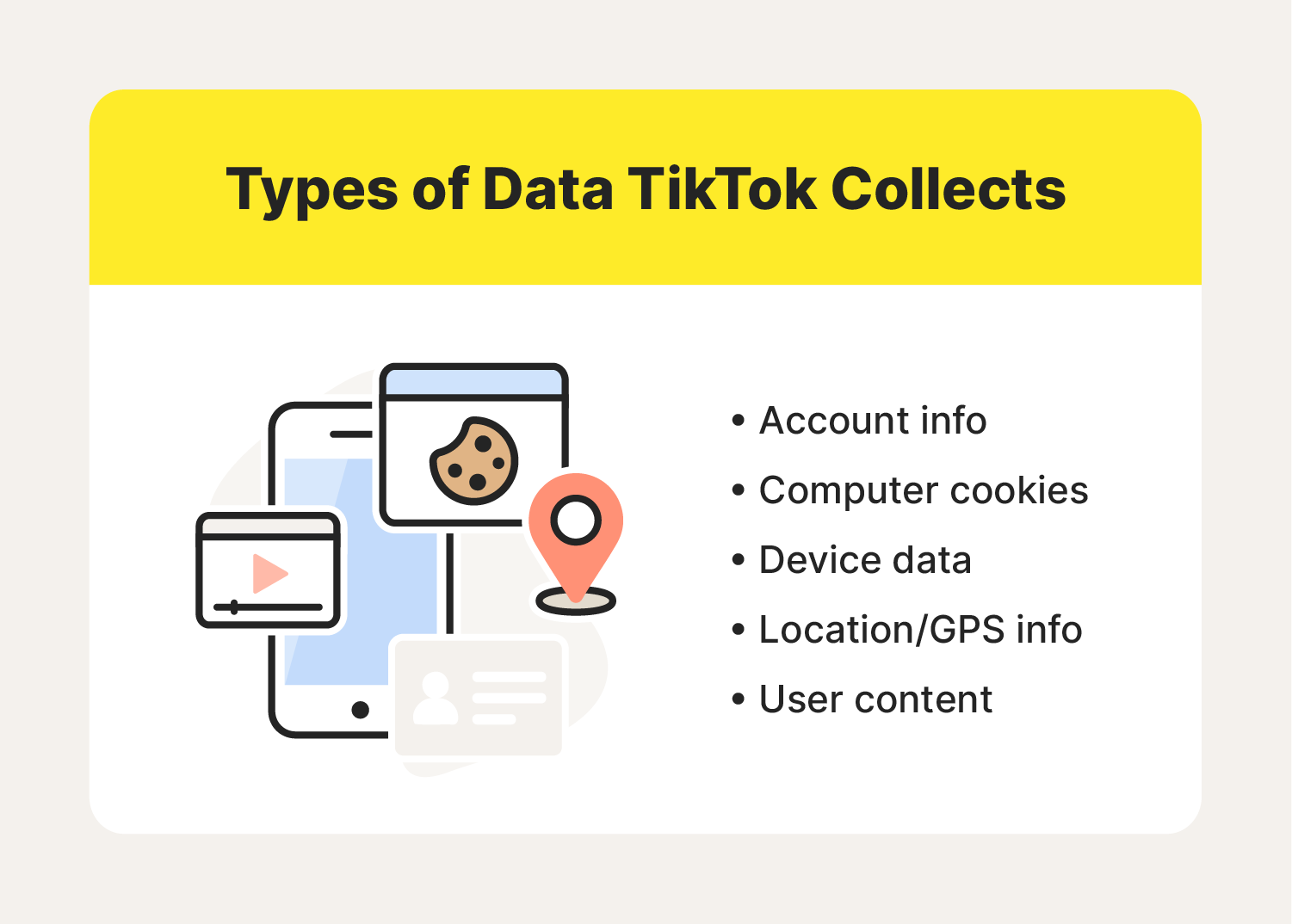

Who does TikTok share data with?
TikTok does share data with multiple organizations for business and regulatory purposes. Some entities that have access to TikTok’s data include:
- Advertisers: TikTok shares user data with advertisers to create targeted ads and better understand user activity.
- Businesses: TikTok shares data with other social media businesses to learn more about user activities on other apps.
- Governments and police agencies: Law enforcement and federal agencies can request user data from TikTok to assist with investigations or to comply with government mandates. This can also happen if the U.S. Congress requests information from TikTok to facilitate a congressional investigation. And under Chinese law, TikTok may be compelled to share data with the Chinese government.
- Third-party apps: TikTok shares user data with some third-party apps that its parent company ByteDance doesn’t own. This connects to TikTok's Jump program, which lets users access third-party integrations from companies like Wikipedia and Quizlet to create content.
TikTok makes its developer data-sharing agreement public, which can help users understand how the company handles their information and works with third parties.
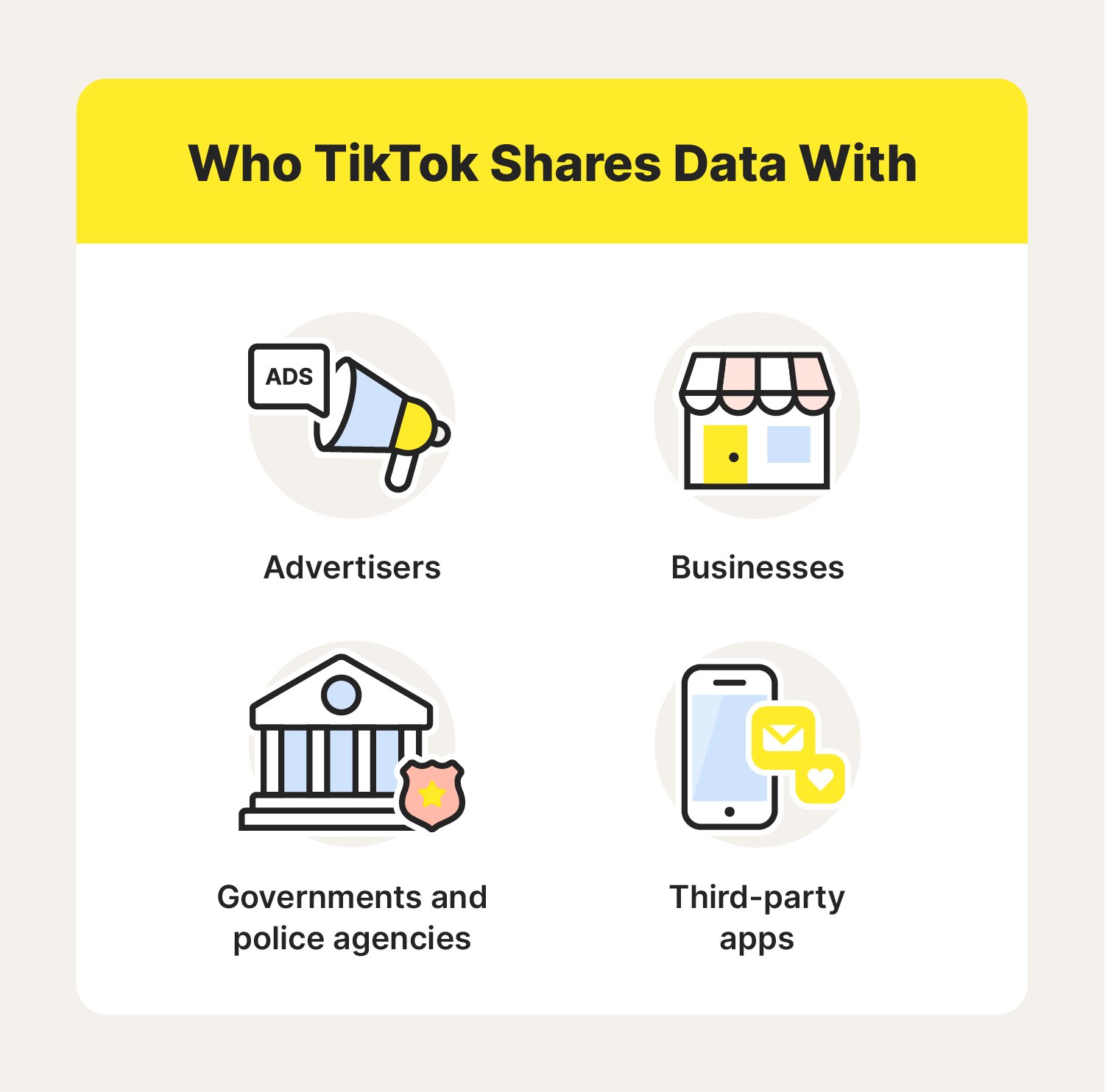

TikTok scams
TikTok faces many of the same social media threats that impact Facebook, Instagram, Twitter, and similar apps — and increasingly, video scams on the platform are being powered by deepfake technology. Here are some TikTok scams to be aware of:
Romance scams
Romance scams prey on individuals seeking a romantic relationship online. Scammers try to build trust over time and then create various, often elaborate stories to justify asking for money or other benefits. In a TikTok romance scam, a bad actor will often create a fake TikTok account and target real users in comments sections or by directly messaging them.
Fake giveaways
Community engagement is a major part of the TikTok experience. Scammers can try to capitalize on this by holding fake giveaways for nonexistent prizes. The severity of these fake giveaways can vary; some accounts might hold fake giveaways to drive engagement, while more nefarious individuals will attempt to steal money or personal information.
Phishing scams
In a phishing scam, a criminal tries to gain access to sensitive information by posing as a legitimate source. On TikTok, a phishing scammer might try to get information by directly messaging a user and asking for details like login credentials or credit card info. TikTok users might even encounter comments or posts that urge them to click a specific link, which can trigger malware or lead to a dangerous website.
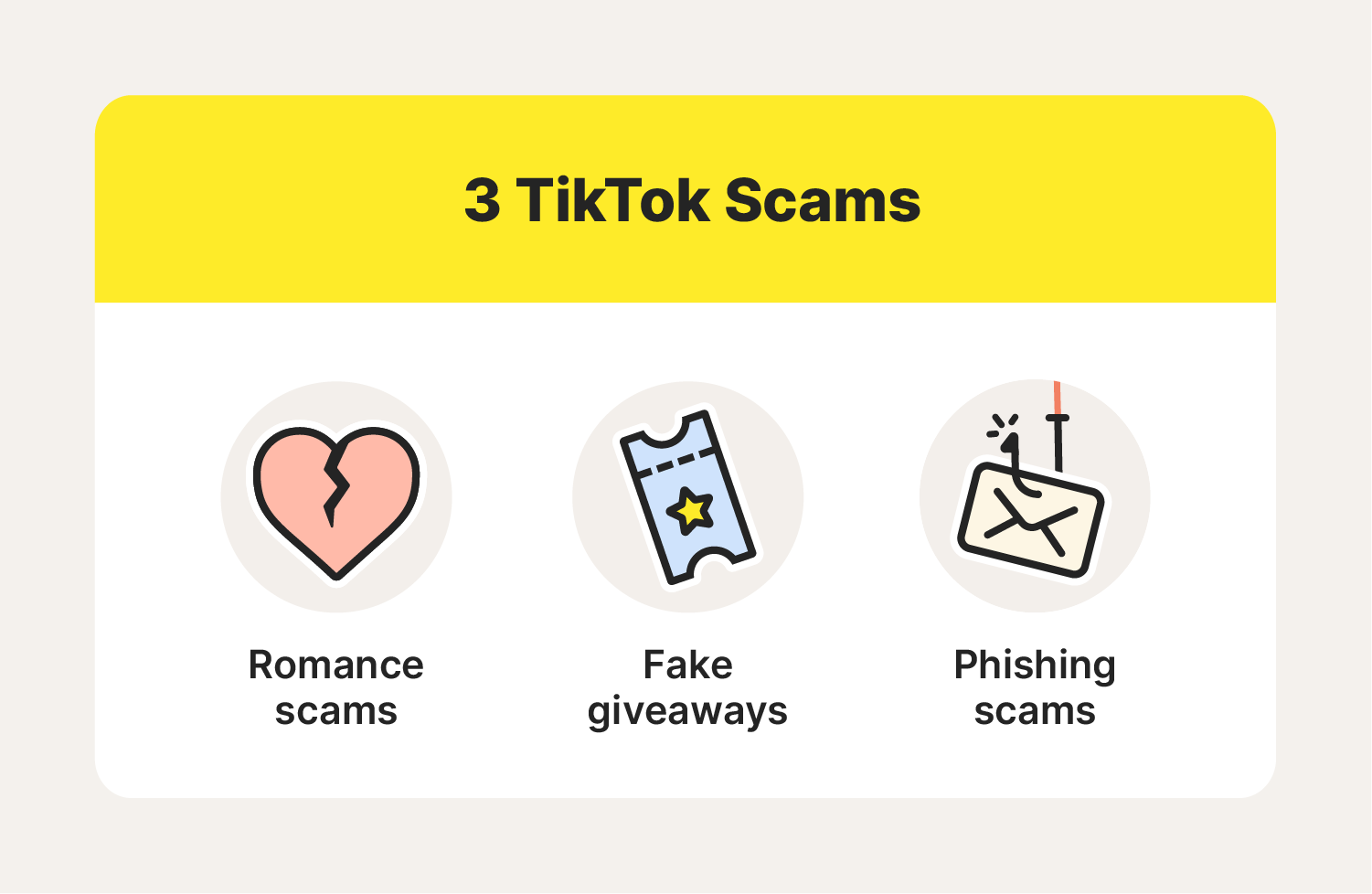

Bad actors, hackers, and criminals can use TikTok to commit various social media scams, but users can use cybersecurity tips to boost their safety on the app.
Cybersecurity tips for TikTok
If you do use TikTok, basic digital hygiene and cybersecurity best practices, like not oversharing and using two-factor authentication to log into your accounts, can help make your time on the app safer. Here are some TikTok security strategies:
- Don’t share private information: Social media apps often spark conversations, but you might not always know who you're talking to. Exercise caution when sharing details about yourself, and never share sensitive info like Social Security numbers or your home address.
- Perform a social media cleanup: Cybercriminals can exploit vulnerabilities in your social media accounts if you aren't careful. Perform a social media cleanup by deleting old accounts you no longer use, making active accounts private, clearing the TikTok cache, and updating your passwords.
- Use cybersecurity tools: Cybersecurity tools can serve as a line of defense against various TikTok scams. A password manager can help you maintain more control over your accounts, while antivirus software can help protect your device from malware. With Norton 360 Deluxe, you even gain access to Deepfake Detection, which can scan videos for manipulation on compatible AI PCs.
Get Norton 360 Deluxe to help protect your digital life
When managing your online life and using social media, protecting your personal information is paramount. Norton 360 Deluxe provides a suite of cybersecurity tools to help you stay safer while you’re on and off the app. With an industry-leading anti-malware engine, dark web monitoring, an AI-powered scam protection suite that includes deepfake detection, and a built-in VPN, Norton 360 will help give you peace of mind online.
FAQs
TikTok crossed the 1 billion user mark in September 2021, so it’s not hard to see why there are so many questions about the app.
Is TikTok safe for kids?
For years, health experts have cited significant concerns about the risks of excessive social media use for children and adolescents. And while effectively implementing social media safety for kids is crucial, it’s challenging. Even if a parent uses the built-in safety features of TikTok and other social media apps, children may be able to overcome them simply by finding a how-to guide online. Have conversations with your child to help them learn how to take more control over their screen time.
Can TikTok track you?
TikTok can track you as soon as you open the app on your device, as it collects a variety of data about who you are and how you use the app. And if you connect your TikTok account to other apps, those third-party apps may have access to some of your account information.
In 2022, security experts discovered a vulnerability within TikTok's Android app that let hackers access and manipulate user accounts. TikTok's developers have since addressed this specific threat, but it highlights concerns about how much user data the app collects and stores.
Can TikTok read my text messages?
TikTok can reportedly read and catalog any message you send through the app. This includes direct messages, comments, and reports you submit via the app’s “Report” feature.
TikTok is a trademark of TikTok Ltd.
Editorial note: Our articles provide educational information for you. Our offerings may not cover or protect against every type of crime, fraud, or threat we write about. Our goal is to increase awareness about Cyber Safety. Please review complete Terms during enrollment or setup. Remember that no one can prevent all identity theft or cybercrime, and that LifeLock does not monitor all transactions at all businesses. The Norton and LifeLock brands are part of Gen Digital Inc.



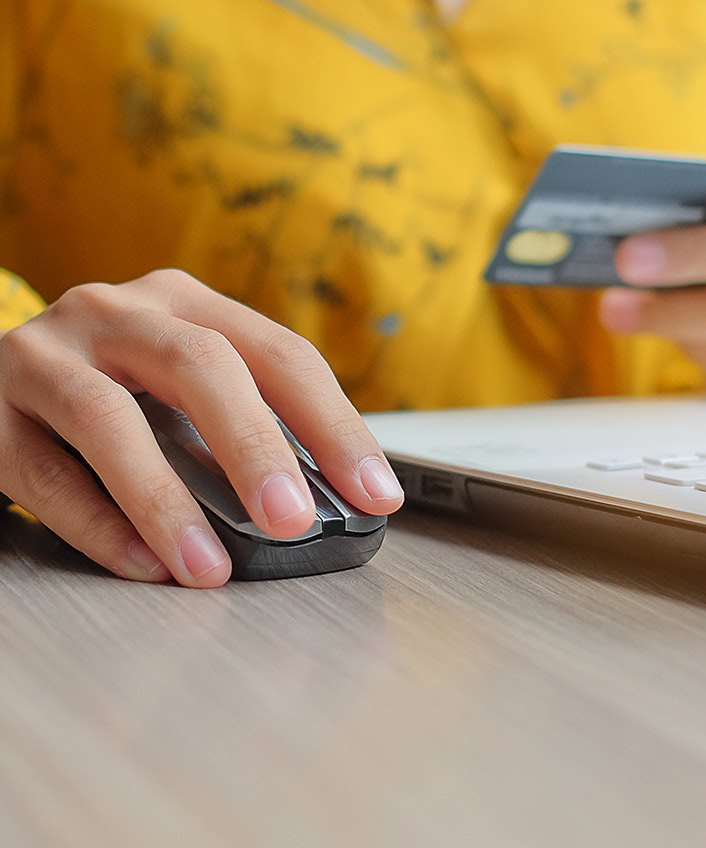



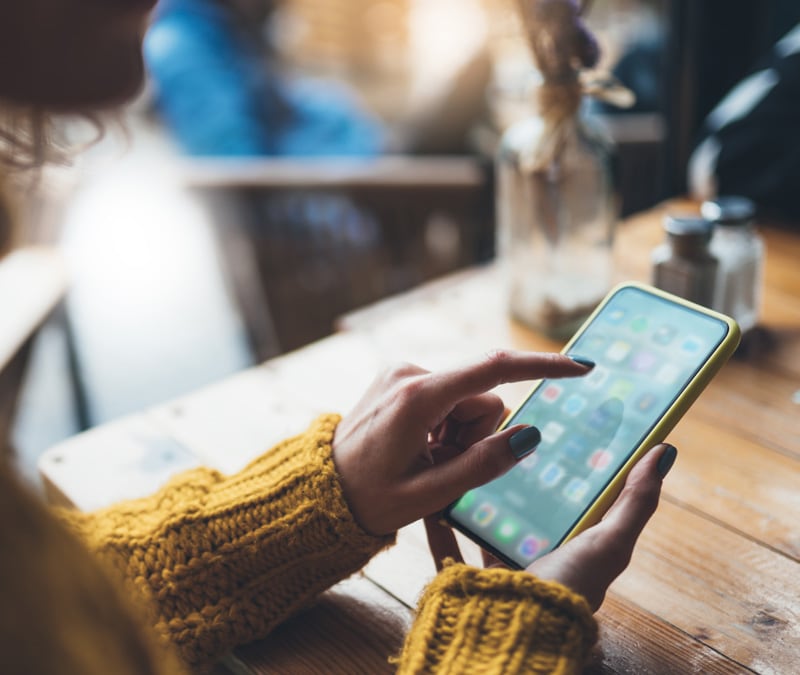

Want more?
Follow us for all the latest news, tips, and updates.